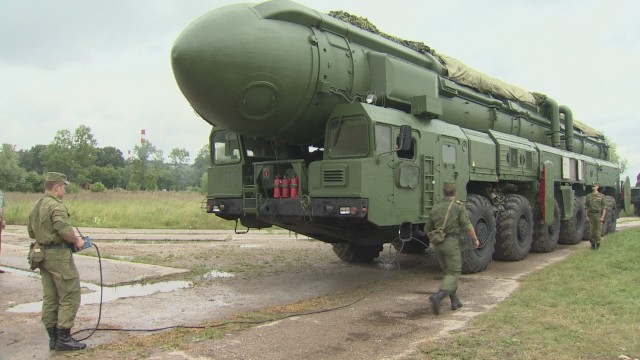By: Amina Abdullayeva
Russia has two main problems with NATO at present: missile defence in Europe and NATO’s presence in the Arctic zone. While the missile question is at the forefront of the media these days, the Arctic issue is less acute, simmering in the background with the potential to cause problems in the near future.
These are two issues where Russia is engaged directly, as opposed to the Libyan Operation, or even the question of Syria. In reality, however, no matter how much tough talk there is, especially from the Russian side, NATO and Russia are on course to cooperate in the near future. There is already considerable cooperation between Russia and NATO both as an organisation, and bilaterally with its member-states. Therefore, what these crises boil down to is Russia’s desire to assert itself as a world power that can still call the shots; relations worsen when Russia feels threatened to be left out or overlooked.
A quick overview of the relationship between Russia and NATO reveals its cyclical nature, whereby a crisis is followed by a thaw – a pattern that has been observed for the past 20 years. The first 40 years of NATO’s existence were a tense period, replaced with hopes of cooperation after the collapse of the USSR. The bright outlook was dampened by disagreements over the Bosnian war that nonetheless ended up in cooperation, and then a new discord over Kosovo, and so on. The most serious crisis came in 2008 when Russia invaded Georgia – a small former Soviet republic, a NATO hopeful, and a country Russia regards as its “near-abroad.” Georgia’s pro-Western leanings could not be tolerated forever, and Russia unambiguously demonstrated that it was not prepared to give up what it considers its sphere of influence. Tensions with NATO were verging on open hostility at that point, but after the war’s quick end, an effort was made to get over that episode quickly and normalize relations. In fact, in NATO’s New Strategic Concept adopted on 20 November 2010 it was expressly stated that “NATO poses no threat to Russia”. Russia, however, remains unconvinced; in fact, its military doctrine states that NATO expansion is a top threat to the country. It points to the missiles in Europe and the “encirclement” in the Arctic to back up its claims of NATO’s malevolent intentions.
While it is obvious that no one in the West expects Russia to attack with nuclear weapons, and while it is just as obvious that Iran’s nuclear program is what is making everyone nervous, Russia obstinately demands guarantees from NATO that its missiles will not be directed at Russian territory. In the meantime, if the developments in Iran continue unobstructed, a situation akin to the Cuban Missile Crisis might arise in the Middle East. It is difficult to understand that the Kremlin is really worried that NATO may attack it. It must be playing a political game, mostly directed internally, in order to convince them that Russia is still somehow threatened militarily. This would help perpetuate the “strongman” rhetoric used in the government and solidify authoritarianism even more. Effectively, the Russian government is using NATO as an excuse to pretend that Russia needs strong leaders, because the external environment is unfriendly; this rhetoric is then translated into internal policies that suspend democratic practices and perpetuate the power of the authoritarian elite.
Thus, the first crisis is a bluff, especially because there are signs of emerging cooperation, as NATO and Russia prepare to hold joint missile defence drills in March. Clearly, Russia wants to be seen as an equal partner in all issues it views as strategically important, which nuclear weapons definitely are.
The second crisis, however, is of a different nature, because the interests of not only the current Russian government, but the country itself are touched. The Arctic is a known source of energy reserves, as well as potential new sea transportation routes. As a country that depends heavily on natural resources (especially oil and gas exports) it is important for Russia to get as much of the Arctic territory as it can. The other five nations that share the Arctic coastline with Russia, Canada, Denmark, Norway, Iceland and the US, are all NATO members. Navy commander Adm. Vladimir Vysotsky said in an interview that they had confirmation “that NATO has marked out the Arctic as a zone of its interests.”
However, here as well there are many signs of a positive development. For example, a landmark treaty between Norway and Russia resolved their 40-year dispute in the Barents Sea. This treaty gave a boost to Russia-Canada relations as well, which had been tepid until recently. The fact that the Arctic issue is set in the UN framework – countries are using the UN Convention on the Law of the Sea to claim swaths of the Arctic Ocean – and the existence of the Arctic Council create favourable conditions for dialogue and cooperation. All the Arctic states realise that they will get nowhere if they do not truly work together. Therefore, it is reasonable to believe that NATO will not be brought into the sovereignty dispute. As opposed to the missile defence shield in Europe, NATO in the Arctic could be directed only against Russia. The Allies understand how unwise such a move would be, particularly those who, like Norway, have finally normalised their relations with Russia.
Thus, of the two Russia-NATO problems, one is a smoke screen that has essentially nothing to do with NATO itself and is not as serious as it may seem. The other – the Arctic question – could turn into a problem if NATO is brought into the scene, but there is little reason to believe that this will happen. Therefore, despite current tensions reported in the media and various declarations and interviews, a thaw in NATO-Russia relations should be expected.
Disclaimer: Any views or opinions expressed in this article are solely those of the authors and the news agencies and do not necessarily represent those of the NATO Council of Canada. This article is published for information purposes only.



